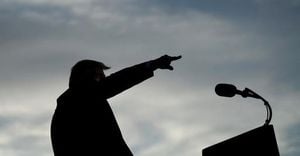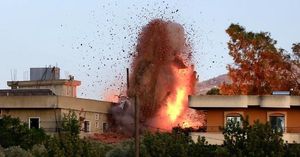In a move that’s turning heads in Washington, the Department of Defense has deployed 20 military attorneys from the Judge Advocate General (JAG) Corps to the U.S. Attorney’s Office in the nation’s capital. This unusual measure comes as President Donald Trump intensifies his administration’s crackdown on crime in Washington, D.C., and as the city’s justice system struggles with severe staffing shortages and a surge in federal law enforcement activity.
According to NBC News and other outlets, these military lawyers—who typically serve the armed forces and handle legal disputes within the military—will now be working side by side with federal prosecutors on civilian cases, focusing primarily on misdemeanors. The assignment is set to begin next week, and the JAGs are expected to undergo training to familiarize themselves with local laws and procedures.
U.S. Attorney Jeanine Pirro, who heads the D.C. office, didn’t mince words about the significance of the move. “The assignment of 20 JAGs to my office is further proof of President Trump’s commitment to fighting and reducing crime in the district,” Pirro said in a statement, as reported by Fox News Digital and 7News. She’s been vocal about the dire state of her office’s staffing, telling Fox News, “I was down 90 prosecutors, 60 investigators and paralegals.” Pirro has even made public pleas for recruits: “If you want a job in the nation’s capital in the premier office, the largest U.S. attorney’s office, contact me.”
The backdrop to this legal shakeup is a city under extraordinary federal intervention. On August 11, 2025, President Trump federalized the city’s police force, deploying roughly 800 National Guard troops and swarms of federal law enforcement officers to patrol D.C. streets. “I’m deploying the National Guard to help reestablish law, order and public safety in Washington, D.C.,” Trump announced, vowing that the troops would be allowed to “do their job properly.”
These actions have coincided with an avalanche of arrests. Attorney General Pam Bondi revealed that, since the federal initiative began, authorities have arrested 630 people, seized nearly 90 illegal guns, and made 77 arrests in a single day. Of those arrested, 24 were identified as illegal immigrants, and the range of charges includes theft, assault with a deadly weapon, drug offenses, assault on an officer, unlawful entry, homicide, robbery, and drug trafficking. FBI Director Kash Patel added that the FBI and its partners made 31 more arrests on August 21, including six illegal gun recoveries and seven drug seizures.
Pirro’s office is not alone in its staffing woes. The D.C. court system is also feeling the pinch, currently operating with 15 judges fewer than the 71 seats required for a full bench—meaning one in every five judicial seats is empty. These gaps have real-world consequences, delaying justice for victims and families, like in the case of a teenager shot at a Metro stop whose case has languished for months, according to 7News.
John Fishwick, a former U.S. Attorney for the Western District of Virginia, told 7News that bringing in JAG attorneys is a logical step given the shortage. “A shortage of prosecutors at a major U.S. Attorney’s office is a significant challenge,” he said. “There are only so many hours in the day, so I think it makes sense to bring in JAG attorneys, military lawyers who’ve got significant trial experience. I think it makes sense to bring them in, fill some of those shortages.”
However, Fishwick also pointed out the challenges ahead. “These new lawyers who are coming in from a military background, they’ll need to learn the local laws, some of the local procedures that will be different from the military court,” he explained. “Sure, they know military law. They may not know the local law as well, yet, but they’ll get trained up. They’re going to start them slowly.” Despite these hurdles, Fishwick is confident the military lawyers’ experience will be an asset. “Military lawyers are used to carrying a pretty heavy case load. Sadly, there’s crime committed within our military where folks either need to be prosecuted or defended from those crimes. They’ve been used to getting a lot of trial experience in a military setting. Yes, it’s different, and the jurors in those cases are other folks in the military and not civilians, but it’s still the basic ground rules. If you break the law, you get prosecuted, and you’re entitled to a good lawyer if you’re being defended in a case. The military background is very similar to our civilian system.”
While federal officials tout the initiative’s early results—such as the Metropolitan Police Department reporting no homicides in D.C. since August 13—local leaders remain skeptical. D.C. officials have pointed to police statistics showing a 30-year low in violence, suggesting the city’s crime emergency may not be as dire as the administration claims. President Trump, however, has questioned the reliability of those statistics and argued that the District still has one of the highest murder and car theft rates in the country.
The federal intervention has also sparked controversy and viral moments. One such incident involved the arrest of Mexican national David Perez-Teofani on the National Mall during a traffic stop. Social media videos showed Perez-Teofani protesting, “I’m not a criminal, I work here, I want to be with my family.” The White House later released details of his criminal history, including prior illegal entries and a charge in Fairfax County for sexually assaulting a minor under 13. The episode quickly became a flashpoint in the ongoing debate over immigration enforcement and federal involvement in local policing.
As for the JAG attorneys’ assignment, its duration remains unclear. The Pentagon has said only that “updates will be shared at the appropriate time, after decisions have been made.” The U.S. Attorney’s Office in D.C.—the largest such office in the country—handles both federal crimes and criminal matters before the D.C. Superior Court, a unique dual role that only increases the pressure on its already strained staff.
President Trump’s crime emergency is currently authorized for another 20 days. Extending it would require Congressional approval—a tall order, given the need for support from Democrats, who have voiced skepticism about the necessity and effectiveness of the federal intervention.
For now, the arrival of military lawyers in Washington marks a rare and dramatic intersection of military and civilian justice. Whether this experiment will help restore order or fuel further debate about federal overreach remains to be seen. One thing is certain: the city’s legal system is entering uncharted territory, and all eyes are on the capital as events unfold.




